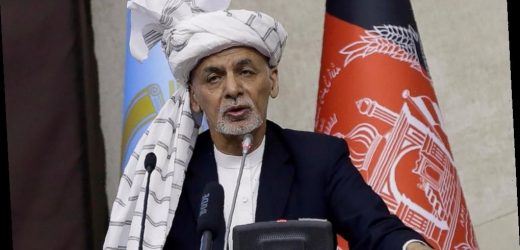KABUL, Afghanistan — Afghan President Ashraf Ghani has made two key Cabinet changes, evoking a strong response Saturday from powerful governing partner Abdullah Abdullah amid increasing pressure from the U.S. to reach a peace agreement with the Taliban.
In May 2020, Ghani and political rival Abdullah signed a power-sharing agreement, two months after both declared themselves the winner of the September 2019 presidential election. Under the deal, Ghani remained president of the war-torn nation while Abdullah was named head of the country’s National Reconciliation Council, which has the authority to handle and approve all affairs related to Afghanistan’s peace process. Abdullah would also be able to appoint half of Ghani’s Cabinet and issue executive orders.
On Friday, the National Security Council issued decrees on behalf of Ghani in which he dismissed Interior Minister Masoud Andarabi and appointed Hayatullah Hayat as caretaker minister. In recent years, Hayat has served as governor of southern Kandahar province.
Army Chief of Staff Gen. Yasin Zia was appointed acting defense minister, replacing Asadullah Khalid.
There was little explanation for the changes, but the moves angered Abdullah. “This decision is against the interests of the country in the current situation and is unacceptable,” he said in a statement released Saturday.
The changes come as a May 1 deadline nears for the withdrawal of U.S. troops and America has increased pressure on both the national government and the Taliban to end decades-old fighting.
The Cabinet changes could be a sign that Ghani is pushing back against the U.S. and opposition’s increasing support for an interim administration. Ghani’s critics have accused him of clinging to power. He says he will leave office only through elections.
The statement from Abdullah’s office said the decision to remove Andarabi came “without consultation, without justifiable reason or reasons, was hastily (made) and in opposition to a political agreement between the two parties.”
The new appointments come as Afghanistan experiences a nationwide spike in bombings, targeted killings and other violence as peace negotiations in Qatar between Taliban insurgents and the Afghan government stall.
The Islamic State group’s local affiliate has claimed responsibility for some of the violence, but many attacks go unclaimed, with the Afghan government putting the blame on the Taliban. The insurgents have denied responsibility for most of the attacks.
On Thursday, Russia hosted the first of three international conferences aimed at jump-starting the peace process ahead of the May 1 deadline for the final withdrawal of U.S. and NATO troops from the country.
The Taliban warned Washington on Friday against defying the deadline, promising a “reaction” if it does, which could mean increased attacks by the insurgent group.
The talks in Qatar between the Afghan government and the Taliban have stalled, but Russia voiced hope that the talks in Moscow could help reinvigorate them.
Source: Read Full Article


